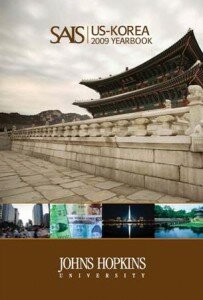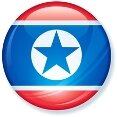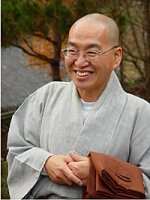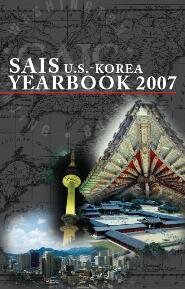Published on September 23, 2010
On September 23, 2010, USKI and the Sejong Society of Washington, D.C. hosted a talk with the Venerable Pomnyun Sunim, who discussed the DPRK’s increasing economic dependency on China and touched on strategic possibilities for the U.S. and South Korea to approach the China-DPRK relationship.
DOWNLOAD
Transcript | “North Korea’s Growing Dependence on China: Implications for the Future of Northeast Asia” (Sept. 23, 2010)
Published on May 17, 2010
After a brief introduction by USKI Director Jae Ku and Ambassador Robert King, David Hawk, the former executive director of Amnesty International U.S., presented his new report, “Pursuing Peace While Advancing Rights: The Untried Approach to North Korea.” Following the presentation, the discussants, Professor Victor Cha and Dr. Sophie Richardson, each provided constructive and insightful comments, as well as criticisms. The event finished with a brief Q&A session during which human rights awareness problems in North Korea were further explored.
DOWNLOAD
Transcript | Pursuing Peace While Advancing Rights: The Untried Approach to North Korea (May 17, 2010)
Full Report | Pursuing Peace While Advancing Rights: The Untried Approach to North Korea, by David Hawk (May 2010)
Published on May 7, 2010
 The U.S.-Korea Institute at SAIS annouces the release of the fourth edition of the SAIS U.S. -Korea Yearbook.
The U.S.-Korea Institute at SAIS annouces the release of the fourth edition of the SAIS U.S. -Korea Yearbook.
Each fall semester at SAIS, the Korea Studies Program offers the course, “The Two Koreas: Contemporary Research and Record,” where students prepare an in-depth report on an issue of importance to Korean affairs in that year. As part of their research, students make a one-week research trip to Seoul to test their ideas with experts and officials. The SAIS U.S.-Korea Yearbook is a compilation of these student papers.
Student authors include: Tze Chin “Alvin” Wong, Paul Elliott, Sogaku Miyamoto, Ian Howard, Kee Hoon Chung, Jason Park, Momoko Sato, Neil K. Shenai, Nick Borst, Naoko Aoki, Zander Lanfried, and Sarah Yun.
Download the 2009 SAIS U.S.-Korea Yearbook.
Published on March 29, 2010
 The U.S.-Korea Institute at SAIS is pleased to announce the launch of 38 North, a website devoted to analysis of North Korea. While this site will strive to break new ground, its main objective is to provide the best possible analysis to all those who work on North Korea for a living—the expert community, government officials and the media—and who are interested in what happens there. Too often analysis of the North is based on inexperience, inaccurate information or just plain bad deductive reasoning. This website will be based on the humble acknowledgement that no one really knows for sure what is going on in North Korea, but we can at least try to understand the possibilities. And anyone who professes certainty should be viewed with the greatest skepticism. read more …
The U.S.-Korea Institute at SAIS is pleased to announce the launch of 38 North, a website devoted to analysis of North Korea. While this site will strive to break new ground, its main objective is to provide the best possible analysis to all those who work on North Korea for a living—the expert community, government officials and the media—and who are interested in what happens there. Too often analysis of the North is based on inexperience, inaccurate information or just plain bad deductive reasoning. This website will be based on the humble acknowledgement that no one really knows for sure what is going on in North Korea, but we can at least try to understand the possibilities. And anyone who professes certainty should be viewed with the greatest skepticism. read more …
Published on September 16, 2009
 Venerable Pomnyun Sunim addressed the role Buddhism has played in defining modern Asia’s religious, cultural, social, political, and economic dynamics. A long-time activist and advocate for human rights, Venerable Pomnyun has worked extensively on advocating peace within the Korean peninsula, including working to supply humanitarian aid to famine victims in North Korea and defending the human rights of North Korean refugees in China. His dedication to Buddhist ideals has not only brought accolades to his work, but has shaped his outlook on the prospects for peace and reconciliation between North and South Korea. read more …
Venerable Pomnyun Sunim addressed the role Buddhism has played in defining modern Asia’s religious, cultural, social, political, and economic dynamics. A long-time activist and advocate for human rights, Venerable Pomnyun has worked extensively on advocating peace within the Korean peninsula, including working to supply humanitarian aid to famine victims in North Korea and defending the human rights of North Korean refugees in China. His dedication to Buddhist ideals has not only brought accolades to his work, but has shaped his outlook on the prospects for peace and reconciliation between North and South Korea. read more …
Published on September 25, 2008
September 24, 2008
Venerable Pomnyun Sunmin and his delegation of North Korea experts came to SAIS to talk about the current situation in North Korea. His delegation was composed of experts from various institutions in South Korea and make up The Peace Foundation and Good Friends’ organizations. He brought a collection of experts on political, economic, unification, defense, and security matters.
Venerable Pomnyun began the evening describing the developing famine in North Korea and its differences from the famine that affected the country in the 1990s; the primary difference being that the famine had affected the lower echelons of the party. The famine has also created secondary affects in increase in petty crime and the development of a market system. The delegation then discussed the political situation and possible four scenarios as it relates to North Korea and its relations with the U.S. and South Korea that can come out of the current impasse. (Summary by Mike Yo, Korea Studies, SAIS). read more …
Published on June 22, 2007
 2007 was a year of extraordinary “big deals” on the Korean peninsula. Following the difficult 2006 that saw North Korea testing its nuclear weapon and difficult negotiations over security and trade issues with Washington, the Republic of Korea (ROK) made remarkable diplomatic breakthroughs on many weighty issues. But these agreements face challenges of ratification or implementation, and much work remains to be done.
2007 was a year of extraordinary “big deals” on the Korean peninsula. Following the difficult 2006 that saw North Korea testing its nuclear weapon and difficult negotiations over security and trade issues with Washington, the Republic of Korea (ROK) made remarkable diplomatic breakthroughs on many weighty issues. But these agreements face challenges of ratification or implementation, and much work remains to be done.
The 2nd Edition of the SAIS U.S.-Korea Yearbook covers principal developments, including these “big deals.” The Yearbook is the product of SAIS’s Fall 2007 course, “The Two Koreas: Contemporary Research and Record.” Each chapter was researched and written by SAIS students based on in-depth readings and study. Additionally, as a part of the course, students conducted field research in South Korea, interviewing numerous government officials, think tank scholars, NGO workers, academics and private sector experts.
The 2007 Yearbook is divided into four parts: U.S.-ROK Relations, U.S.-DPRK Relations, Korea in the Region and Korean Politics. read more …



 Venerable Pomnyun Sunim addressed the role Buddhism has played in defining modern Asia’s religious, cultural, social, political, and economic dynamics. A long-time activist and advocate for human rights, Venerable Pomnyun has worked extensively on advocating peace within the Korean peninsula, including working to supply humanitarian aid to famine victims in North Korea and defending the human rights of North Korean refugees in China. His dedication to Buddhist ideals has not only brought accolades to his work, but has shaped his outlook on the prospects for peace and reconciliation between North and South Korea.
Venerable Pomnyun Sunim addressed the role Buddhism has played in defining modern Asia’s religious, cultural, social, political, and economic dynamics. A long-time activist and advocate for human rights, Venerable Pomnyun has worked extensively on advocating peace within the Korean peninsula, including working to supply humanitarian aid to famine victims in North Korea and defending the human rights of North Korean refugees in China. His dedication to Buddhist ideals has not only brought accolades to his work, but has shaped his outlook on the prospects for peace and reconciliation between North and South Korea. 
